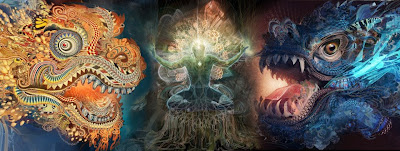
: It is made of virtue and vice. it is made of all that is near: It is made of all that is afar. It is made of all.'
What, then, is nonduality in terms of a state of mind? How does the mystic who has realized his identity with the One reality think and feel? Does his consciousness expand from out of his body and enter into all other things, so that he sees with others' eyes, and thinks with others' brains? Only figuratively, for the Self which is in him and in all others does not necessarily communicate to the physical brain of John Smith, mystic, what is seen by the eyes of Pei-wang, construction worker, on the other side of the earth. I do not believe spiritual illumination is to be understood in quite this sensational way. We shall answer the question sufficiently if we can discover what is a nondualistic state of mind. Does it mean a mind in so intense a state of concentration that it contains only one thought? Strictly speaking, the mind never contains more than one thought at a time; such is the nature of thinking. But if spirituality means thinking only and always of one particular thing, then other things are excluded and this is still duality. Does it mean, then, a mind which is thinking of everything at once? Even if this were possible, it would exclude the convenient faculty of thinking of one thing at a time and would still be dualistic. Clearly these two interpretations are absurd, but there is another way of approach.
Spiritual illumination is often described as absolute freedom of the soul, and we have seen that the One Reality is all-inclusive. Is the mind of the mystic singularly free and all-inclusive? If so, it would seem that his spirituality does not depend on thinking any special kinds of thoughts, on having a particular feeling ever in the background of his soul. He is free to think of anything and nothing, to love and to fear, to be joyful or sad, to set his mind on philosophy or on the trivial concerns of the world; he is free to be both a sage and a fool, to feel both compassion and anger, to experience both bliss and agony.
And in all this he never breaks his identity with the One Reality-God, 'whose service is perfect freedom.' For he knows that in whatever direction he goes and in whichever of these many opposites he is engaged, he is still in perfect harmony with the One that includes all directions and all opposites. In this sense, serving God is just living; it is not a question of the way in which you live, because all ways are included in God. To understand this is to wake up to your freedom to be alive."
What, then, is nonduality in terms of a state of mind? How does the mystic who has realized his identity with the One reality think and feel? Does his consciousness expand from out of his body and enter into all other things, so that he sees with others' eyes, and thinks with others' brains? Only figuratively, for the Self which is in him and in all others does not necessarily communicate to the physical brain of John Smith, mystic, what is seen by the eyes of Pei-wang, construction worker, on the other side of the earth. I do not believe spiritual illumination is to be understood in quite this sensational way. We shall answer the question sufficiently if we can discover what is a nondualistic state of mind. Does it mean a mind in so intense a state of concentration that it contains only one thought? Strictly speaking, the mind never contains more than one thought at a time; such is the nature of thinking. But if spirituality means thinking only and always of one particular thing, then other things are excluded and this is still duality. Does it mean, then, a mind which is thinking of everything at once? Even if this were possible, it would exclude the convenient faculty of thinking of one thing at a time and would still be dualistic. Clearly these two interpretations are absurd, but there is another way of approach.
Spiritual illumination is often described as absolute freedom of the soul, and we have seen that the One Reality is all-inclusive. Is the mind of the mystic singularly free and all-inclusive? If so, it would seem that his spirituality does not depend on thinking any special kinds of thoughts, on having a particular feeling ever in the background of his soul. He is free to think of anything and nothing, to love and to fear, to be joyful or sad, to set his mind on philosophy or on the trivial concerns of the world; he is free to be both a sage and a fool, to feel both compassion and anger, to experience both bliss and agony.
And in all this he never breaks his identity with the One Reality-God, 'whose service is perfect freedom.' For he knows that in whatever direction he goes and in whichever of these many opposites he is engaged, he is still in perfect harmony with the One that includes all directions and all opposites. In this sense, serving God is just living; it is not a question of the way in which you live, because all ways are included in God. To understand this is to wake up to your freedom to be alive."
No hay comentarios:
Publicar un comentario